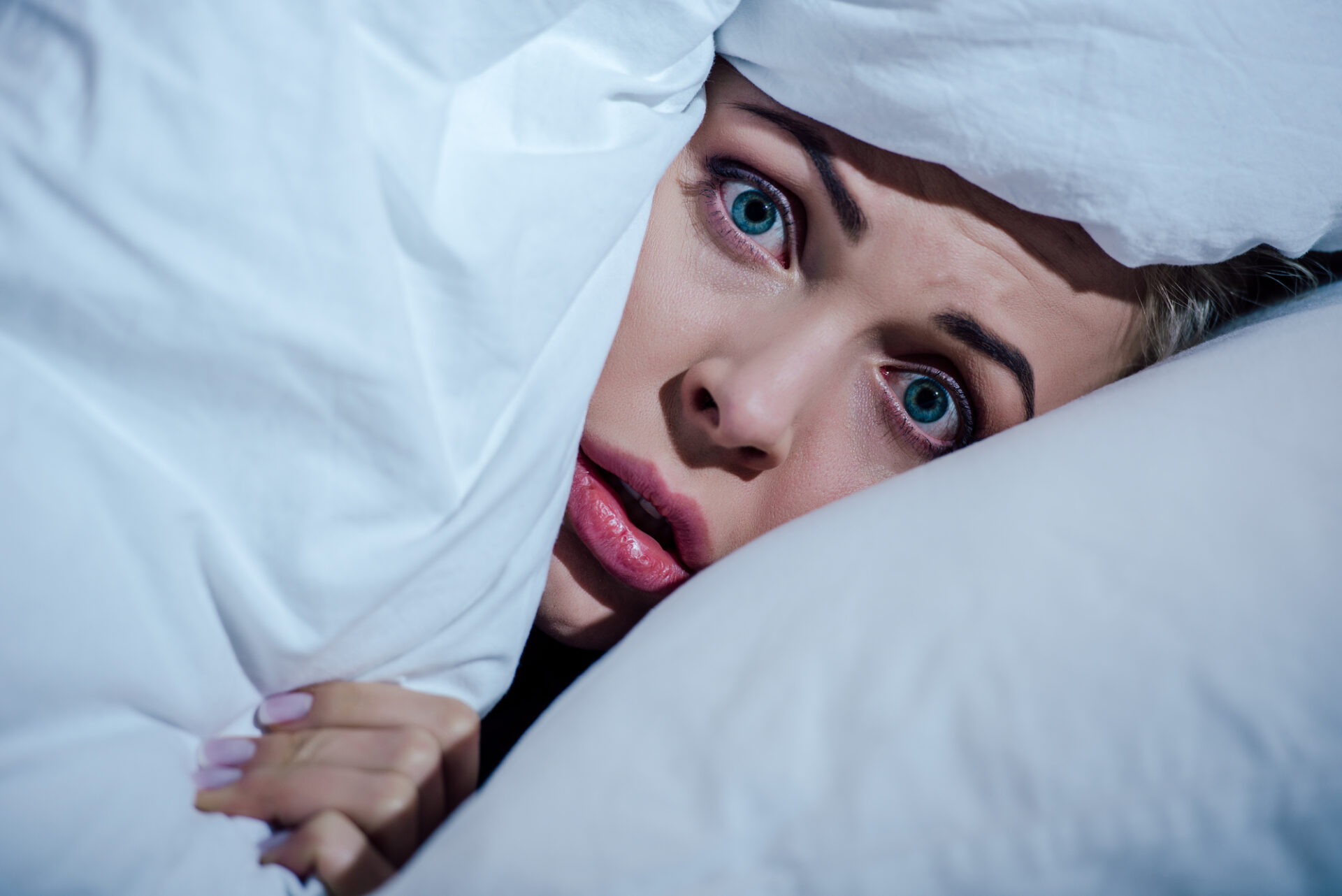What Can You Do If You Have Trouble Sleeping?

Many people experience sleepless nights where they find themselves tossing and turning for hours before finally drifting off to sleep. If you are one of these individuals, you should know that the problem is a lot more widespread than you’d think.
A quarter of the American population suffer from sleeping problems in which they have trouble falling asleep and/or staying asleep (https://www.sciencedaily.com/releases/2018/06/180605154114.htm).
Experiencing one or two restless nights in a month shouldn’t be too concerning. However, if you suffer from this problem frequently, you may start to feel the effects of long-term sleep loss. This includes issues, such as poor memory and concentration, depressed mood, and anxiety symptoms.(https://www.ncbi.nlm.nih.gov/books/NBK19961/).
So what can you do if you have trouble sleeping? Let’s look at the common methods used to treat sleep problems.
How To Resolve Sleep Problems
The best way to correct sleep problems is to identify the source of your sleeplessness and resolve it. If you suffer from short bouts of sleeplessness known as “acute insomnia”, your sleep disorder may resolve itself within a few days.
However, if you have trouble falling asleep every night for multiple weeks, you may have “chronic insomnia”. Chronic insomnia is a serious issue that can take a toll on your physical and mental health. It requires treatment and the right medical advice to resolve.
Both acute and chronic insomnia can be triggered and exacerbated by major stress and/or emotional discomfort. However, chronic insomnia can also be caused by other underlying medical issues. To treat chronic insomnia, you will need to correct whatever is causing you stress and discomfort.
If you are unable to resolve the underlying medical condition that is aggravating your insomnia, you can try different strategies to help you fall asleep. These include:
Creating a Comfortable Sleep Environment
Your sleep environment can have a significant impact on the quality of your sleep. If your bedroom is bright and noisy, you may not be able to fall asleep with ease.
To create a better sleep environment, you should:
- Paint the walls a calming color, such as blue.
- Pick a mattress and pillow that are comfortable to sleep on.
- Remove unneeded sources of light such as televisions from the bedroom.
- Set up curtains that can block out all the light from the window.
- Turn off or get rid of any noisy appliances. You may also be able to drown out sources of noise with the help of a fan or by playing peaceful sounds on a speaker.
Following a Sleep Schedule
Our bodies have an internal circadian rhythm that automatically conditions us to feel sleepy at night. However, this sleep cycle can be disrupted if you sleep at inconsistent times throughout the week. If you wish to fall asleep faster, you should aim to go to bed at the same time every day.
You can create a sleep schedule by keeping track of your sleep habits and then selecting a bed time you are comfortable following consistently. Sleeping at the same time every day can be a challenge initially, but it should get easier as your internal cycle adjusts.
Light Therapy
Another way to re-calibrate your internal sleep cycle is with the help of light therapy. This treatment is performed by exposing yourself to a special lamp for certain hours of the day under the supervision of a sleep specialist.
Many people who live in regions where the hours of daylight vary greatly throughout the year use light therapy. When used correctly, this lamp can induce drowsiness at night and can also help you wake you up in the morning.
Restrict Bed Usage
If you are having difficulty falling asleep, you should get out of bed and sit elsewhere. Lying in bed when you aren’t sleeping can make it harder to fall asleep in the future. You should restrict bed usage to times when you intend to sleep; otherwise, your mind will start associating sitting/lying in bed with being awake.
Practicing Better Sleep Hygiene
There are many habits that can induce and/or aggravate sleep disorders. This includes consuming stimulants such as caffeine and nicotine close to bed time. Similarly, eating a heavy meal before going to bed can cause heartburn and insomnia (https://well.blogs.nytimes.com/2011/09/05/really-the-claim-to-reduce-heartburn-dont-eat-four-hours-before-bed/). All these habits are part of poor sleep hygiene.
If you wish to practice better sleep hygiene, you will need to cut back on these habits. You can also add some good sleep hygiene practices to your life, such as exercising regularly, and following pre-bedtime relaxation techniques.
Relaxation Techniques
Practicing certain relaxation techniques can calm down your mind and help you sleep better at night. Many people use meditation or yoga to enter peaceful head space that persists throughout their day. Even simple breathing exercises can do wonders to help you sleep at night.
Here’s a demonstration of a breathing exercise to aid sleep: https://www.youtube.com/watch?v=RI71gFrp8w4
Sleep Apnea and How To Resolve It
Many Americans suffer from sleep problems due to a medical issue known as sleep apnea. People with this condition find that their breathing repeatedly stops for ten seconds or more when they are sleeping. Untreated sleep apnea doesn’t just interrupt your slumber, it can also lead to serious problems such as cardiovascular disease or even premature death (https://www.webmd.com/sleep-disorders/sleep-apnea/obstructive-sleep-apnea-causes).
This condition is often caused by obesity, so losing weight may help you resolve it.
Another way to treat this problem is by wearing a sleep apnea mouthpiece. This mouthpiece is specially designed to keep your airway open when you are sleeping.
However, this special apparatus can’t be purchased from shops or online stores. If you are interested in getting a sleep apnea mouthpiece, you will need to get in touch with a dentist who can make a custom fitted one for you.
Sleep Aids
Many people who have trouble falling asleep turn to medication such as sleeping pills for help. These substances may help you get a good night’s rest initially but they can be addictive. Taking these pills too frequently can cause your body to develop a tolerance to them and lead to other health problems down the line.
If you are interested in finding over the counter sleep aids that are non-addictive and safe to use, there are many options available.
Melatonin
Melatonin is a hormone that is produced naturally in your body. This chemical is responsible for inducing drowsiness at night and helping you sleep. If you suffer insomnia, taking melatonin supplements regularly could help you fall asleep at night. These supplements are non-addictive and do not cause health problems associated with sleeping pills.
Some popular melatonin supplements include:
- NOW Supplements (https://www.amazon.com/NOW-Supplements-Melatonin-180-Capsules/dp/B003KLROVY)
- ZzzQuil Pure Zzzs Melatonin Sleep Aid Gummies (https://www.amazon.com/Vicks-Melatonin-Chamomile-Lavender-Valerian/dp/B07N46LTJJ/)
- Natrol Melatonin Fast Dissolve Tablets (https://www.amazon.com/Natrol-Melatonin-Dissolves-Absorption-Strawberry/dp/B07S38C5WW/)
Chamomile
Chamomile is a natural herb that has a calming effect. It is often brewed as tea and consumed before bed to induce better sleep. This herb does not produce the sedative affect that sleep pills do, but it may reduce symptoms of anxiety that are keeping you awake (https://www.ncbi.nlm.nih.gov/pmc/articles/PMC5650245/).
People often drink chamomile tea an hour or two before going to bed due to its calming effect. Some popular Chamomile tea brands are shown below.
- Bigelow Cozy Chamomile Herbal Tea Bags (https://www.amazon.com/Bigelow-Chamomile-Tea-Caffeine-Free-Individual/dp/B000GFYRK8/)
- Celestial Seasonings Herbal Tea, Chamomile (https://www.amazon.com/Celestial-Seasonings-Herbal-Chamomile-Count/dp/B000E6829G/)
- Taylors of Harrogate Organic Chamomile Herbal Tea (https://www.amazon.com/Taylors-Harrogate-Organic-Chamomile-Teabags/dp/B00CREXUOU/)
You should avoid Chamomile products if you are allergic to rag or other plants in the daisy family.
Valerian root
Valerian is another natural herb that can help you fall asleep faster. Studies have found that supplements made from valerian root may reduce the amount of time it takes to fall asleep, and also improve sleep quality (https://www.ncbi.nlm.nih.gov/pmc/articles/PMC4394901/). Some popular valerian root supplements include:
- NOW Supplements, Valerian Root (https://www.amazon.com/NOW-Valerian-Root-500-Capsules/dp/B0019LTHXA)
- Nutricost Valerian Root Capsules (https://www.amazon.com/Nutricost-Valerian-Root-Capsules-1000mg/dp/B07JNHQBBK/)
- Sundown Valerian Root (https://www.amazon.com/Sundown-Valerian-Root-530-mg/dp/B000GG23B2/)
Frequently asked questions
Here are some frequently asked questions about sleep problems.
Q: What should I do if I can’t sleep?
A: If you’re having trouble sleeping, you should get out of bed and sit elsewhere until you are drowsy enough to sleep. Additionally, you could practice relaxation exercises to help your mind and body wind down.
Q: How can I sleep better at night?
A: You can improve your sleep quality by exercising regularly, avoiding stimulants such as caffeine and nicotine before bed, and by creating a comfortable sleep environment that is free from bright lights and noise.
Q: Is insomnia a serious illness?
A: Chronic insomnia is a serious illness that can increase your risk of developing mental health problems and other health concerns (https://www.healthline.com/health/insomnia-concerns).
Summary
Many people experience problems falling asleep at night and/or staying asleep. These issues can be caused by stress or underlying medical conditions. If you suffer from sleep problems you should try the following steps:
- Create a comfortable sleep environment that is free from bright lights and noise
- Limit consumption of caffeine and nicotine late in the day.
- Practice relaxation techniques during the day or breathing exercises before going to bed.
- Avoid staying in bed when you are awake.
- Take natural sleep supplements, such as melatonin and valerian root, or drink chamomile tea before bed.
Leave a comment if you have any questions, or share your experience dealing with sleep problems.

